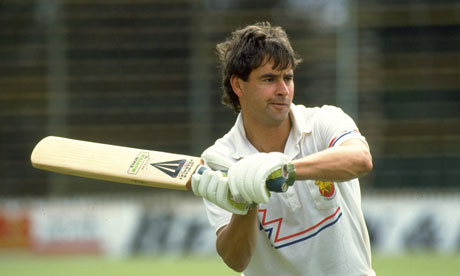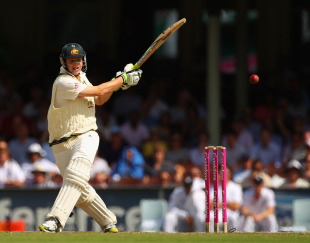Number 11= Chris Cowdrey
Highest Ranking 1
Total Points 12
Number of Votes Received 2/13
Another entry at number 11 in this list and another one brought to you by those lovely people at
Rent a Journeyman County Pro. For Chris Cowdrey, however, he was a special case. Not satisfied with merely being a journeyman county pro, he was also a JCP who was the son of one of England's most revered batsmen of all time. As you'd expect, the pressure was heaped upon him from a young age.
These days, the name Cowdrey is shunned in revered in equal measure – due to the relative merits of Cowdrey Snr and Cowdrey fils. Cowdrey was inferior to his celebrated father in pretty much every way imaginable when it comes to cricket. However, he did surpass his father in one way, but more of that later.
Chris was born in Farnborough in what used to be Kent, and is now part of Greater London. He was baptised by his father’s occasional England opening partner, the Reverend David Sheppard and his godfather was Peter May – another England batsman. His father was occasionally described as the bluest blooded of England cricketers, and was the first England cricketer to be elevated to the peerage. As such, Chris’ upbringing could easily be described to be privileged and he was schooled at the exclusive Tonbridge School.
Given his upbringing, it was no surprise that he followed a cricketing career – debuting for Kent at the age of 18 against Yorkshire in a one day game in 1976. Sadly, he neither batted nor bowled in that game and was unable to push for further county honours that season. However, at the end of that summer, Cowdrey took to the field as captain for England U19s at the Queen’s Park Oval in Port of Spain. Amongst the boys he led on that tour were future England luminaries – David Gower and Mike Gatting – as well as the less celebrated Bill Athey, Paul Downton and Paul Allott. In a pretty successful tour, Cowdrey led the way with the bat in the only official ‘Test’ – top scoring in both England innings with a 48 and a 69. Interestingly, a young Mike Gatting opened the bowling for England and took match figures of 9 – 109.
1977 was Cowdrey’s breakthrough year for Kent – making his first class debut against the touring Australians in May – taking his first wicket Doug Walters – but not getting a chance to bat due to heavy rain which heavily impacted the match. His county debut against Middlesex a week later was similarly depressing, with only 41 overs bowled across 3 days. Finally, he got a chance to bat against Derbyshire in the next game – shifted up to open alongside Bob Woolmer.
It was a long time coming, but by the time August came around, Cowdrey made his first ton – an unbeaten 101 against Glamorgan in Swansea; helped over the line in a last wicket partnership with his England U19 team mate, Paul Downton.
From there, his county career went from strength to strength, becoming a fixture in the side in 1977/78 and being awarded his county cap in 1979.
His 1983 season was the first that his name started to be touted for higher honours. Up until this point, he was still living on that ton against Glamorgan and had only finished one season the right side of the 30 mark in the batting averages. 1983 was different though – he racked up 5 centuries and finished the season with a batting average of nearly 57 across 22 games. 1984 wasn’t quite so successful, but he remained in the selectors minds. So it was, that when Ian Botham refused to tour India in 1984, that the selectors saw Chris Cowdrey as an ideal replacement (despite at the time having taken less than 70 first class wickets - yep another one of those people who could have been the replacement for Botham - possibly the first, and surely one of the most inept at doing so?)
On his test debut in Bombay at the Wankhede Stadium – alongside familiar faces such as Gower, Gatting and Downton, he didn’t have the best of times with the bat –scoring 13 and 14 in an 8 wicket defeat. However, he was fielding at short leg as Ravi Shastri and Kapil Dev built up a formidable looking partnership for the 6th wicket when David Gower threw him the ball. Too surprised to even take off his shin pads, be bowled Kapil Dev with his 4th ball in Test cricket. Surprising his father so much that whilst listening to the match on the radio, Colin took a wrong turn down a one-way street as the wicket fell. Chris became the 19th bowler to take a wicket for England in his first over in Test cricket and, incidentally, exceeded his father who never did take a test wicket.
It was in vain though as Shastri and Syed Kirmani piled on 200 runs for the 7th wicket.
The 2nd Test saw the tables turn as England ran away victorious by 8 wickets. Cowdrey’s contribution was 38, but proving a useful partner Tim Robinson who compiled a match-winning 160.
Cowdrey’s biggest contribution to the series was in the series-winning 4th Test. Gower used him in Madras as the stock seamer – operating around Norman Cowans and Neil Foster to ensure they remained sprightly enough to take wickets. Twice in the first innings, however, Cowdrey took vital wickets – first bowling the formidable Mohammad Azharuddin – looking dangerous on 48, before later taking the wicket of Kapil Dev who had put on 80 in partnership with Kirmani. Fowler and Gatting scored double tons in a score of 652 – 7 declared for England as they took the series lead (which they would hold on to) by 9 wickets.
But really, in that series, Cowdrey’s contribution had been minor. He’d scored 96 runs at 19.2 and taken 4 wickets at 72 a piece. In particular, in the final Test in Kanpur he was taken to the cleaners with the ball.
But what is it about Cowdrey which earns so much ire? Surely, these are minor offences in the grand scheme of things. He only played 6 games, he was unsuccessful but the team went alright I suppose. What’s the problem?
It stems from the 6th of his 6 Tests. He hadn’t played since that summer in India in 1985. It was the crazy summer of 4 captains as the rampant West Indies made hay against a hapless England. Wisden commented at the time, "The morale and reputation of English cricket has seldom been as severely bruised as it was during the 1988 Cornhill Insurance Test series against West Indies”.
Mike Gatting started the series as captain. The first match at Trent Bridge was a draw, salvaged by a Graham Gooch ton and some inclement weather. Gatting was sacked after the match for alleged indiscretions with a barmaid. This was coupled with the previous winter’s Shakoor Rana finger-wagging incident and led to his dismissal. John Emburey took the reins and were beaten, but not embarrassed by the 134 run defeat. The 3rd Test as Old Trafford though was an absolute nadir for the team. Dismissed for 135 and 93 in a combined total of 103 overs as a revolving door selection policy cost England dearly. In contrast, the West Indies calmly racked up 387/7 declared and won by a whopping innings and 156 runs. Emburey was sacked.
And this is where our hero reappears. Chris Cowdrey had over the preceding years built up a reasonable reputation as captain of Kent, but it was still a massive surprise to see him plucked from county cricket and given the job of captain of a rather dysfunctional England team. This was accompanied by cries of nepotism (his godfather Peter May was Chairman of Selectors at the time) as well as the usual cries of parochialism from the county cricket set (Southern bias, etc.) “We believe Cowdrey's style of leadership is what is now required” said May at the time.
This, of course, could all have been forgiven with a strong performance from the Skipper. No such performance was forthcoming.
The Test started off particularly ignominiously for Cowdrey – when he was refused entry to the car park on the opening day of the Headingley test as the gatekeeper didn’t recognise him. On a personal level, things went from bad to worse for him. Cowdrey was dismissed for a dismal duck (Lbw to Marshall) in the first dig as England collapsed from 183 – 4 to 185 – 8 and 201 all out. In the second innings, he played all around a Courtney Walsh delivery and was bowled for 5. It all could have been vastly different if Allan Lamb hadn’t torn his left calf muscle. England were 183 – 4 at the time, and Lamb had put on 100 with Robin Smith and the collapse started straight after Lamb’s departure. As it was, England only trailed by 74 on first innings, but another collapse in the 2nd dig put paid to any comeback chances.
There was a week in the schedules before the 5th Test was due to start, so Cowdrey returned to county cricket. He there picked up an injury which made him unavailable for the 5th Test. He never played for England again.
So, that disastrous 5th Test, claims that the Captaincy was wholly undeserved and a perception that he was over-privileged blue-blood and Cowdrey finds himself in this list.
He has subsequently become quite a successful after dinner speaker, occasional radio commentator and in 2012 was named President of the Lord’s Taverners.
Career Highlight
A duck, a five, a sound thrashing and the crowd and the press saying you don't belong there anyway. It's Chris Cowdrey's test as captain.
What they said about him
(Not much, it seems. His dad seems to get most of the attention)
[On selecting in the "Worst player draft"]I'm going to get the all-rounder and captain in early, all in one.
Chris Cowdrey
Six tests. 101 runs @ 14. 4 wickets @ 77. His one match as captain was lost by ten wickets. You won't find many worse players than that.
Poor Chris Cowdrey couldn't help who his dad was - I know the 'specialist captain' thing had worked with Mike Brearley, but he had good players at the time.
Cowdrey had a disorganised mess around him, half a new team every Test match and players organising rebel tours at lunch!!




